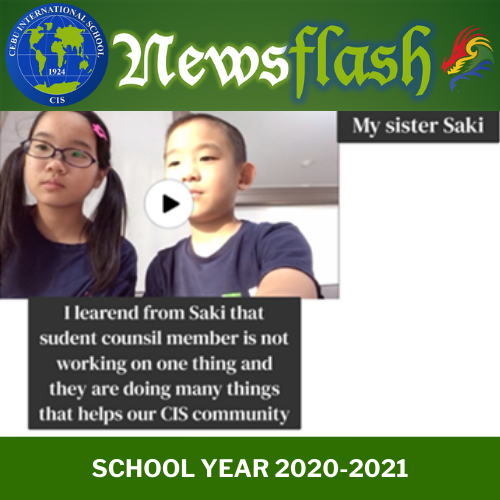
Elementary News
by Mr. Glenn Davies, Elementary School Principal
Dear Elementary School Community,
Over these few weeks since we have returned to learning following the mid-year or Christmas break, our teachers have been gathering some mid-year benchmark data on student progress, particularly in the areas of reading and mathematics. This data is gathered as a checkpoint to measure the growth in student achievement over the first semester in response to our teaching and carefully designed learning engagements. Ordinarily, there are many factors that influence the rate of student growth and achievement, however, over time our students at CIS do consistently gain skills, knowledge and a wide range of competencies. Over these past weeks, the feedback from teachers has been consistent, our students have continued to learn and to meet our CIS curriculum standards over these past months. What has been different, however, are the other competencies that have developed. There would normally have been a greater emphasis on the development of collaboration and social skills associated with classroom interactions, but what has been noticed is the increase in self-management skills around time and independence. Additionally, students have learned to collaborate and cooperate in different ways. Last week, during our Design Day 2, I was so impressed with the way students managed their online presence, the way they listened respectfully to each other and took their turns providing each other with feedback. No one in our CIS community wished to find themselves in a long term Remote Learning environment, but I am pleased to acknowledge that everyone has made the very best of this context to continue learning and enriching their lives in every way possible.
Library/Media Center Class
For our last unit, Library Media Center Classes collaborated with the Homeroom unit of inquiry. Students continued to have virtual read alouds during our synchronous calls. Here are some of the learning engagements from our classes.
For our Early Years students, we read books about living and nonliving things. We had a sharing about their characteristics during our calls.
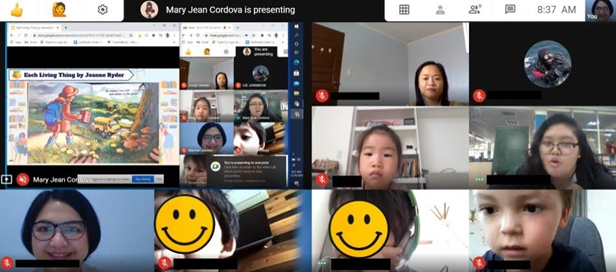
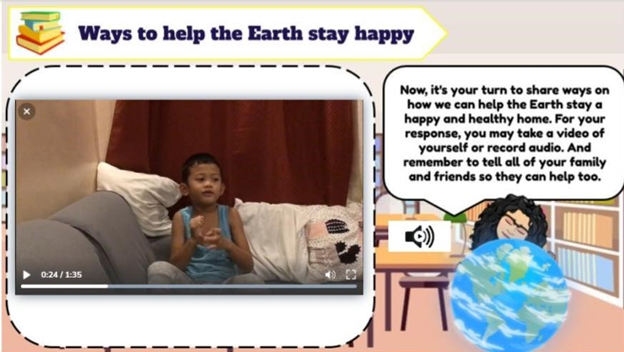
“Make sure to always bring a water bottle so that there will be less plastic. Also, make sure to turn off the power (electricity) when no one is using.” – Audey KG1
“Reduce, reuse and recycle.” – Aryana KG1
“We should not waste water or food and buy only things that we need.” – Cameron KG1
“We should plant more trees and take good care of all the animals so that the Earth will be happy.” – Alivia KG1
Grades 4 and 5 students looked into different poetic techniques used by poets like Emily Dickinson, Kenn Nesbitt and Shel Silverstein and we explored the poetic forms they use.
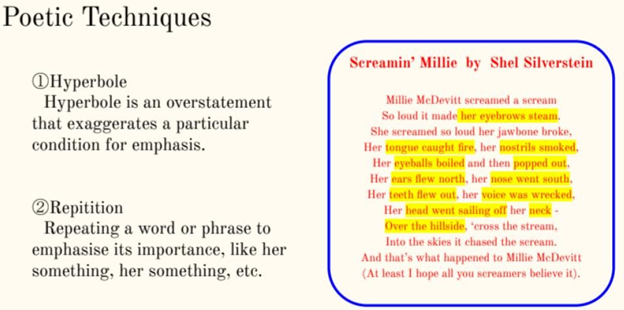
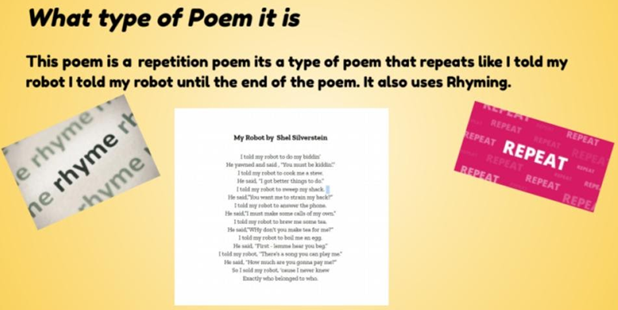
For our KG1 students, we read books on how we can protect our environment. Students learned that they can be their own superheroes and they can start it in their very own home.
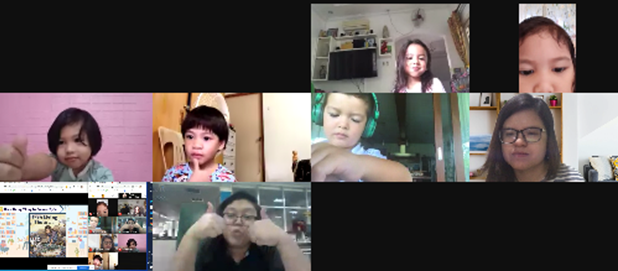
For our Grades 2 and 3 students, we learned how to check trustworthy media sources and how to do basic keyword searches.
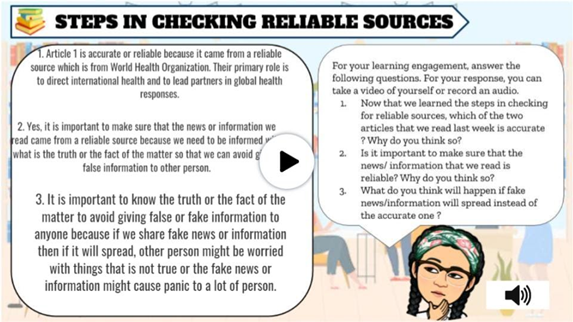
“It’s very important that we are not misled, because it could be a matter of life and death especially in a pandemic. Many people can die due to misinformation, if fake news spreads and unchecked.” – Jansen G3
“It is important to know the reliability of the news that we read because what we get out of anything in the news affects what we can do to the situation. If it isn’t reliable we could do something bad or even worse because of it.” – Rose G2

In grade 3, we were researching which groups we belong to. The students asked their loved ones about which groups they have been a part of and what they learned from being a member of a group.
Here are some of the answers:
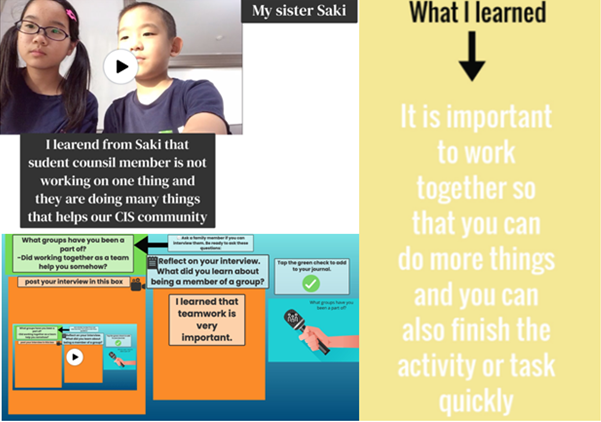
We have also been practicing how to show important events on a timeline. The students researched what events had happened during their lives, and once they had found the most interesting events, they created their own timelines.
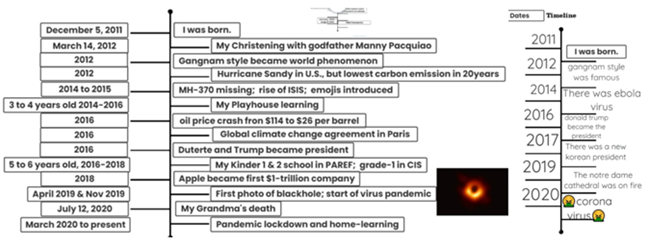
Middle and High School News
by Mr. Dale Wood, Middle and High School Principal
Language and Learning
Linguists have posited that, although complex language may not be essential for rudimentary (functional) levels of thinking, it is necessary for the development of complicated, abstract thought. The more complex the idea, the more precise the terms required to formulate important distinctions, nuances, and connotations which might distinguish that idea from one that may be similar.
Especially given our physical isolation, it is ever more important that we choose our words with care. One of the adjustments we have made within our remote learning is introducing and utilizing a new set of terminology so that we can all share an understanding of and can function within the new structures we have in place. A clear example if this would be the distinction between the terms synchronous and asynchronous. Synchronous comes from the Greek roots for together (syn) and time (chronos), so synchronous, at its root, means “time together”. The Greek root “a” means without or not; hence, asynchronous means “time not together.” The following table delineates the difference between the two distinct formats for our remote learning context.
| Term | Description |
| Synchronous class/meeting | This is a live meeting where the teachers and the students are talking with each other via video conference using Google Meet video chat. This can also involve students engaged simultaneously in a learning activity. |
| Asynchronous learning engagement | This is a learning engagement that is posted on Google Classroom which students may work in their own time and at their own pace. Asynchronous learning needs to be very clear and linked to assessment criteria so that it is clear what content knowledge and skills students are developing. |
| We have set aside time in the afternoons for students to learn asynchronously, but they also have the option to meet with the teacher individually or in a small group or collaborate with classmates. |
One of the things we have focused on recently, both in Elementary School and in Middle and High School, is taking particular care with the terminology we use when describing what we are doing in school. Although using the terms “kids” for our children is not inherently incorrect, calling them “students” places the emphasis on the fact that they are learners. The use of the latter term reminds us as teachers of our guiding statements and that our mission is to educate our learners rather than just work with kids. Similarly, the term “schoolwork” would seem to emphasize the labor that students undertake while they are in class without clarifying that that labor needs to be focused on learning, and more specifically- their learning. Replacing a term like “schoolwork” with a much more intentional educational term like “learning engagement” again emphasizes the type of work that our students are involved in, learning work as opposed to busy work. Another important term that we have been using, and which has been really brought home by the MYP, is the term assessment as opposed to test. For many of us the word test carries negative connotations of stress, anxiety, of someone being out to get us. Often students measure their success on tests by what they did wrong (how many points did I get off for…?). By contrast, the term assessment, which comes from Medieval Latin and literally means “to sit beside”. The picture we have is of a teacher sitting down beside a student and guiding him or her to a deeper understanding and a stronger ability to perform. With assessment, the emphasis is on what the student does right, as the teacher carefully measures the quality and degree of a student’s mastery of skills and standards with a view to helping guide them toward continuous improvement.
With that said, our focus this week is on our classes which are centered on our students developing their language skills (skills which overlap with most, if not all, of our IB ATL skills and Learner Profile traits).
English as an Additional Language
by Mr. Steve Campbell, MHS EAL Teacher
Language Acquisition
How does it happen?
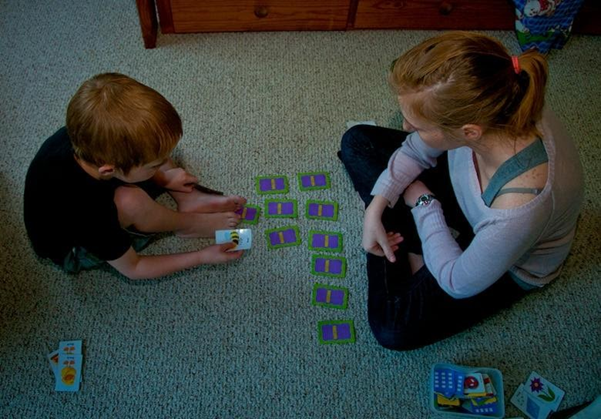 Introduction
Introduction
‘Draw an ‘M’ in the air and hope the taxi driver takes you to the nearest McDonald’s Restaurant’ -this was my friend’s last resort if he was hungry and didn’t know the language. Many of us have travelled overseas either as a tourist or for work. We have been confronted with the dramatic difference that can occur when not speaking the new country’s language and what that can do to your day. No taxi, because the words cannot be pronounced, no food because the food order can’t be spoken, and maybe no direction because we can’t read the signs.
One couldn’t be blamed for copying my friend’s Plan B. But what if we wanted to learn language? How could this be done? By rote? By writing down a few essential words and phrases and then rattling them off? Turn right/ turn left? This may help you to get by, but it is not what will lead to fluency.
Should one learn grammar and enter grammar competitions? This has been done in the past and the teaching of grammar mechanics alone has not resulted in the desired language acquisition. What then?
The research supports the idea that we acquire language through messages that we can understand. We gather these messages through our senses, through what Krashen* describes as comprehensible input. The messages may be auditory, visual or involve other senses. The more senses involved, then the easier it is for us to remember. Rhymes that young children use are effective because multiple senses are involved: oral/speaking, hearing, kinesthetic/clapping, drawing, and moving. Students have to be in a natural communicative environment such as a classroom where communication is done using all of these prompts.
TALKING is not Practicing
Just talking ‘at’ others is not practicing language. Saying ‘hola’ each day to a number of people on the street is not adding to learning. There should be comprehensible input for learning to occur, and after new input has been received, the inclusion of this new information could be considered practicing. An example might be in a English Language and Literature lesson, where a student learned a new vocabulary word (e.g. biography). Practicing would be mastering that vocabulary term through using it correctly in a structured and safe environment, such as- “The Biography of Doug Deep was the story of the life of a miner.”
Once the student knows/ reads this, and has practiced it, then they may be asked to share it orally. We read aloud only after practice, because we want to scaffold for success. This is considered language acquisition practice because of the input and the context. It is most likely to succeed because it has been structured for student success. This is unlike the original example above where strings of phrases are used for taxi instructions, or language is mimicked by simply watching foreign language television. Language cannot be considered to be acquired without comprehensible input.
RESPECT the SILENCE
Speaking ability emerges gradually. There is a considerable period of time when speaking does not happen for new language learners. It is a period of six months at its shortest and sometimes up to two years for some learners. A good analogy is that when a child is born, the infant ‘listens’ for nearly a year before speaking the words “mama” or “dada”. This particular speaking event is not the beginning of language acquisition. That language acquisition began with listening – and started well before the day those first words were spoken.
As professional language teachers we know that students are learning while they are listening during this period, that is, if comprehensible input is given. This is known as the ‘Silent Period’. Teachers of ELLs (English Language Learners) respect this silent period of language acquisition because there is an awareness that patience is an important part of the process.
MAJOR FACTORS for SUCCESS in Language Acquisition
- MOTIVATION – a student should have a motivation to acquire the language in order to be successful.
- SELF ESTEEM – students needs to see themselves in a positive light, regarding themselves as language learners. The learner must ultimately believe that their own language learning will result in feeling even better about themself.
- ANXIETY – for language acquisition to occur the level of anxiety has to be low- or even zero. Anxiety works in inverse proportion to language acquisition.
The higher the anxiety; the lower the language acquisition -for example if anxiety occurs when being asked to produce an answer spontaneously- then the lower the chance of language learning being able to occur in that situation.
So, the best way to learn English is to be cool about it!
Information for this article was sourced from article/s or video input referenced below.
For further reading: http://www.sdkrashen.com/content/books/principles_and_practice.pdf
Language Acquisition Courses
by Ms. Elaine Jin, Middle & High School Mandarin B Teacher
As our Grade 11 and 12 students are preparing for their IBDP Internal Assessments (IA’s) and final exams, teachers are diligently seeking ways to refine and further expand students’ depth and understanding. Language Acquisition is one of those subjects for which RL can pose a challenge, as our students need frequent practice and opportunities to practice and interact with the language through discussion. Thankfully, CIS students are responsible, respectful, and prepared, and have been very diligent in mastering the knowledge and skills needed to successfully prepare for these upcoming assessments.
Mandarin AB Class
Our Grade 11 Mandarin Ab Initio students are steadily improving their Chinese Character writing skills through their weekly writing project. They successfully incorporate suggested words and sentence phrases to express their ideas and to identify the specific purpose of their writing within the topics we are studying.

Mandarin B Class
 Our Grade 11 Mandarin B class students are developing their language skills with variety activities in remote learning. The students are working on the Themes of Identity and Experience with different topics. In the topic of health the students have done research and presented orally about the coronavirus. The students use different online tools to enhance their language skills, such as quizlet, padlet and flipgrid. With the given format the students also learn how to follow different formats to write essays, such as the format of blog, email etc.
Our Grade 11 Mandarin B class students are developing their language skills with variety activities in remote learning. The students are working on the Themes of Identity and Experience with different topics. In the topic of health the students have done research and presented orally about the coronavirus. The students use different online tools to enhance their language skills, such as quizlet, padlet and flipgrid. With the given format the students also learn how to follow different formats to write essays, such as the format of blog, email etc.
Spanish B Class

Our grade 12 students are developing their speaking, writing, and comprehension skills through our current topic- Rite of Passage. We talk about how different cultures have ceremonies or rituals centered on the passage to bring individuals from one group to another. In our case, we are talking about bringing teenagers from belonging to an adolescent group to belonging in the group of adults. We are discussing the Puer-Senex theory of Carl Jung and the long transition to adulthood that young people might have. We are also preparing possible Rites of Individualization that nowadays societies might implement within their respective cultures.
Finally, Our MHS Language and Literature courses have also been delving deeply into the English Language and evaluating powerful and effective ways to communicate, both through literary texts and other channels.
Spanish Ab Initio Class
Our Grade 11 Spanish Ab Initio students continue to develop their speaking skills in Spanish to prepare for a successful performance on their upcoming IA (internal assessment). One of the tasks for the IA is for students to be able to describe a picture and explain how the people look and what they are doing. As part of this exercise students created a helpful slideshow containing a range of questions and answers in Spanish.
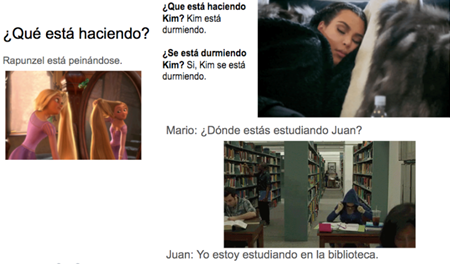
Mandarin ab Initio Class
Our Grade 12 Mandarin ab initio students are focused on further developing their speaking and listening skills within several topics as the IBDP IA (Internal Assessment) approaches. Student brainstorming in Mandarin and English is utilized to expand on the content from assigned photos that serve as a springboard for language use. They practice how to organize all the information they want to express in a logical and thorough way.

Our Grade 12 Spanish Ab Initio students are mastering their speaking and writing skills in Spanish to improve their confidence and preparedness for their coming assessments. As Social Organization is part of one of our IB themes, students have talked and written about the advantages and disadvantages of living either in the city or the countryside. Following the writing formats students have successfully combined the format, using complex sentences and vocabulary related to that topic.
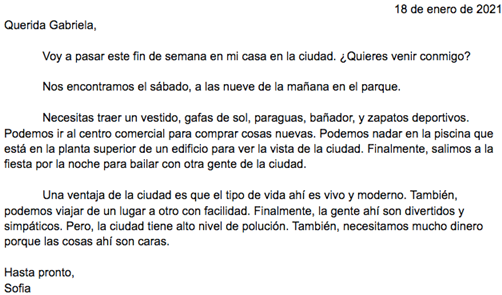
Our Grade 12 Mandarin B class is working on preparing for the speaking assessment portion of the DP. The students use various pictures as samples and learn how to analyze the pictures and express themselves with details and examples. Through studying the criteria and conducting both self assessments and peer assessments, the students are able to clearly understand how their performance is measured according to the IB grading framework. While students are practicing their speaking they have also reviewed a lot of past papers in the reading and writing area to become more familiar with the nature of this specific assessment. In doing so they are getting prepared for the IB final exam.
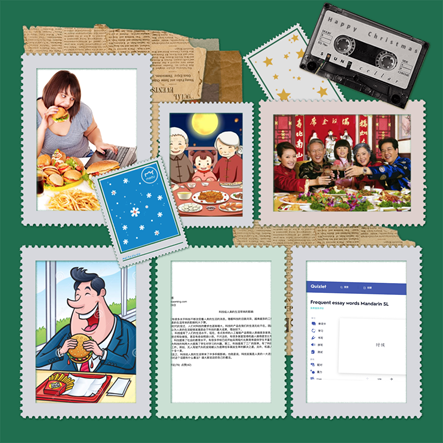
Grade 10 Language & Literature
by Mr. Corryn Smith, MHS Language & Literature Teacher
In Grade 10 Language and Literature, students are working to answer the following question in our current unit exploring Shakespeare’s play “Twelfth Night”: What about Shakespeare’s writing style makes his work unique and worthy of study?
To answer this question, students have been exploring the metrical structure of Shakespeare’s writing referred to as Blank Verse or lines of writing consisting of five beats of stressed/unstressed syllables for a total of 10 syllables in each line. In understanding what makes this Blank Verse worthy of study, students have been tasked with exploring their favorite Hip Hop and R&B artists to find contemporary examples of Shakespeare’s timeless rhythms. Here’s an example from NIKI & Rich Brian’s song “Shouldn’t Couldn’t Wouldn’t”. Grade 10 student Stefan H. transcribed the lyrics in this song as shown in the video here highlighting examples of Blank Verse.
Stefan H. transcribes “Shouldn’t Couldn’t Wouldn’t”
Grade 11 English Language & Literature HL
by Mr. David Gibson, MHS English Language & Literature Teacher
Year 11 students are delving deep into the tale of Frankenstein as adapted for the stage by Nick Dear. Students are very much enjoying examining the wider connotations of the tale which are as valid today as it was when the novel was written in the early 19th Century. Dealing with excesses of pride and the dangers of unbridled scientific endeavour, students are able to reflect on the highly significant themes even as they are played out in their everyday experience.
“I like how the play Frankenstein shows us another side of the Creature that is not normally portrayed in mainstream media. It especially gives us an insight as to how the Creature is aware of himself and may be considered ‘smart’ to some extent, but still does not have a full understanding of morals.” – Sofia V.
Students are further enabled to look into the depth of allusion within the play, exploring symbolism and dynamic as the story unfolds.
“I always knew about who and what Frankenstein was, but never to the extent that I do now. It’s so interesting and mind blowing how the author was able to connect biblical stories to the characters and storyline of this play”. – Bianca M.
“I enjoy studying such a classic story in detail, which allows us to learn its underlying symbols and allusions. By doing so, we also explore the themes of desire and its consequences.” – Deandra R
Frankenstein both expresses its themes at a modern level in regard to science and at a universal level in regard to rejection, prejudice and pride in relation to biblical imagery in the loss of Eden and the fallen archangel’s dilemma in Milton’s Paradise Lost.
“I enjoy the biblical allusion and how there is a little more ‘underneath the surface’ with this piece of literature [allowing] us to focus more on the meaning and reasoning of certain scenes.” – Dominic L.
Grade 8 Language and Literature
by Mr. Jon Denton, MHS Language & Literature Teacher
Grade Eight Language and Literature (L&L) is currently involved in an interdisciplinary unit (IDU) together with Individuals and Societies. An IDU combines the skills, perspectives, and understandings of two or more disciplines to work toward a shared product.
In L&L we are exploring persuasive techniques through our Statement of Inquiry:
A CREDIBLE SOURCE COMMUNICATES THEIR IDEAS WITH THE PURPOSE TO INFORM RATHER THAN TO PERSUADE.
Students have been using their critical thinking skills to analyse a variety of texts and speeches to identify the author’s purpose, and explain how and why they are using different literary strategies. We have used the PEEAL paragraph structure (point, evidence, explain, analyse, link), first introduced to Grade Eight in Individuals and Societies earlier this year, to deliver our thoughts.
We are still at a very early stage of the unit, however here are two student samples that are based on Chimamanda Ngozi Adichie’s TED-ex speech, the Danger of the Single Story.
Sample One
To successfully deliver a compelling speech, Chimamanda Adichie uses a few techniques as she shares the danger of reading “single stories”.
Miss Adichie uses humor to help create a connection with the audience and put them at ease, as her story that is based on her personal experiences is serious. This is apparent when she said, “My characters also drank a lot of ginger beer because the characters in the British books I read drank ginger beer. Never mind that I had no idea what ginger beer was.” She gives this “humorous” comparison not only to entertain her audience but also to emphasize or to show how the children’s books she read influenced how she characterized the people in her writing. This would leave a good impression on the audience even if her topic is a bit weighty because she has lightened the load. From this, it is clear that the purpose of her use of humor in her speech was to connect and engage the audience.
The heavy use of personal pronouns is observed throughout the speaker’s speech, and this was used mainly to engage the listeners as she delivers her personal story. This is noticeable when she said, “Because all I had read were books in which characters were foreign, I had become convinced that books, by their very nature, had to have foreigners in them, and had to be about things with which I could not personally identify.” She personally addresses herself to effectively share the unintentional consequence of her reading foreign books, and the pronoun “I” makes her speech more like a conversation with the audience. Undoubtedly, Miss Adichie’s purpose in using personal pronouns was audience engagement, to give them a reason to lend an ear to her words.
Therefore, to conclude, from the points discussed above, it is evident that the techniques observed in Miss Adichie’s speech were used to make it effective for her audience.
Sample Two
To have a good speech Chimamanda used some techniques as she shared her story about reading books as a little girl that had an effect on her writing.
A technique she is using is emotive language as she speaks because, by her word choices, you can really see and feel the emotions she is having by telling her story. In the speech she says that she grew up only reading western books. This had affected her writing because she thought that she needed to write like that because she did not know people like her could be in writing. She states in her speech that since she had only seen in the book illustrations were blonde children drinking ginger beer and commenting about how the weather was beautiful in the stories she wrote. The author is trying to make us feel what she went through by trying to put us in her shoes so we can understand how this affected her writing of her own. She is trying to make the audience understand her view of how she had thought that writing was supposed to be like but in reality writing can be anything you really want it to be.
In conclusion the author is trying to make us feel something by trying to put us in her shoes of how she grew up with only reading these types of books and didn’t know about different books.
To keep up to date with what is happening in our L&L class, please check out our class website.
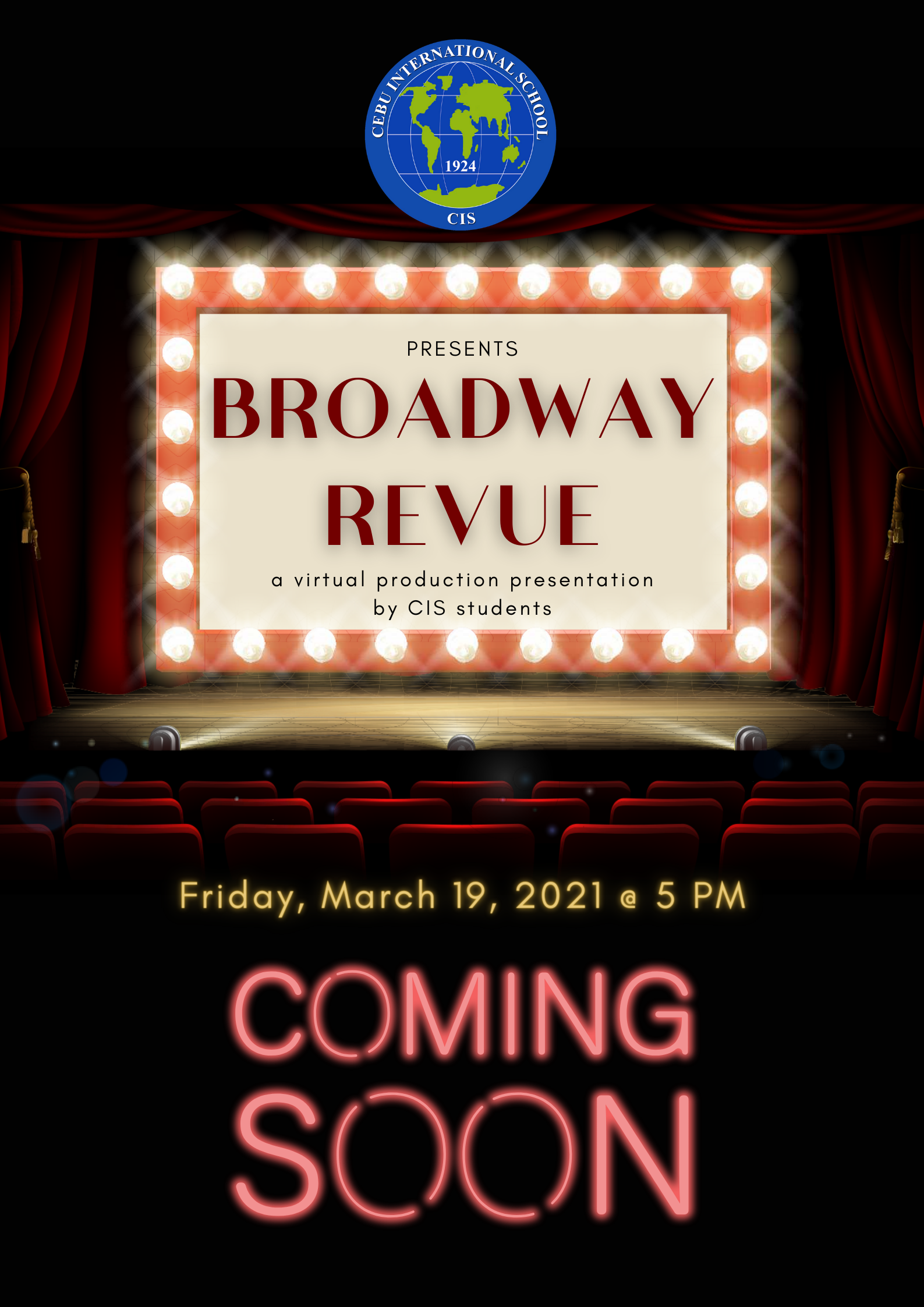
Class of 2021 College & University Acceptances

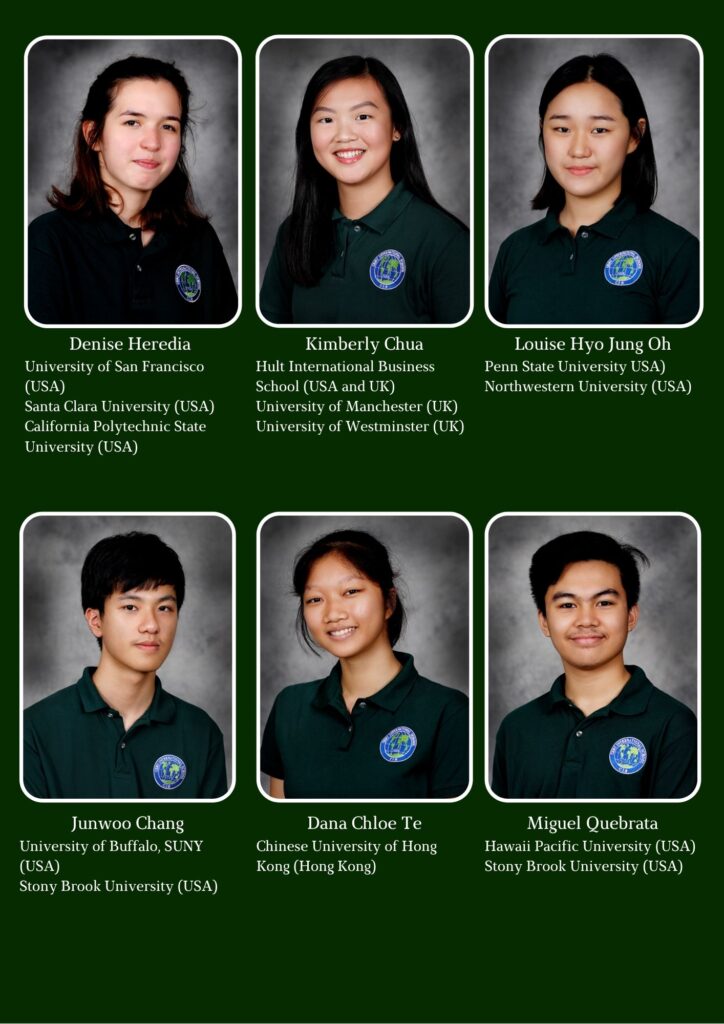
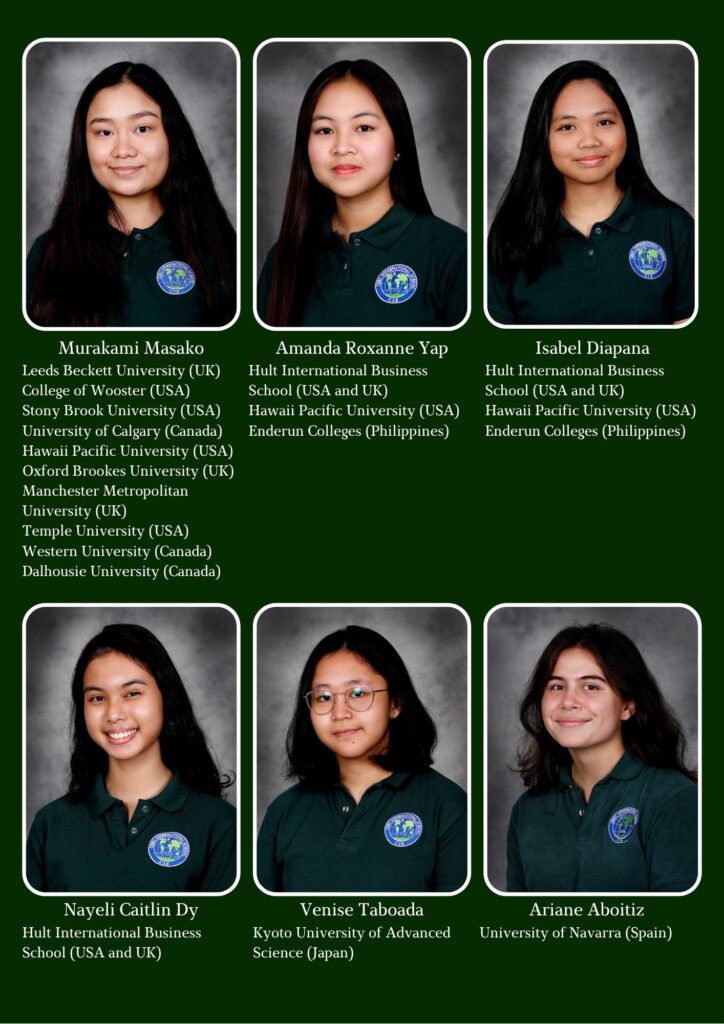
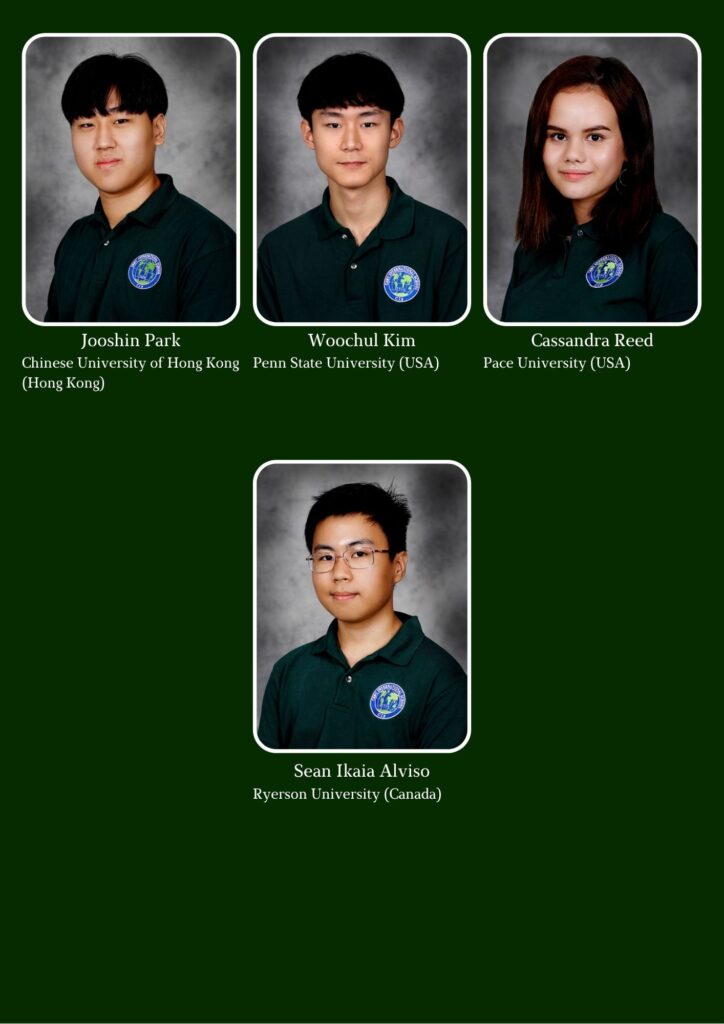
College/Careers Counselor Corner
by Ms. Jenny Basa, College/Careers Counselor
Tip for the Week:
Keep a record. When applying for college, most local and international universities are interested in what you do outside the classroom. Keep a record of your extra-curricular activities and awards received. These may be workshops, camps, webinars, online or onsite activities that you have undertaken from Grade 9 – 12. You will organize all of these in a resume’ which will be very useful when you fill in application forms in senior year.
Upcoming Virtual Events and Fairs: (students & parents are welcome)
DATE
January 31
Sunday
10:00AM
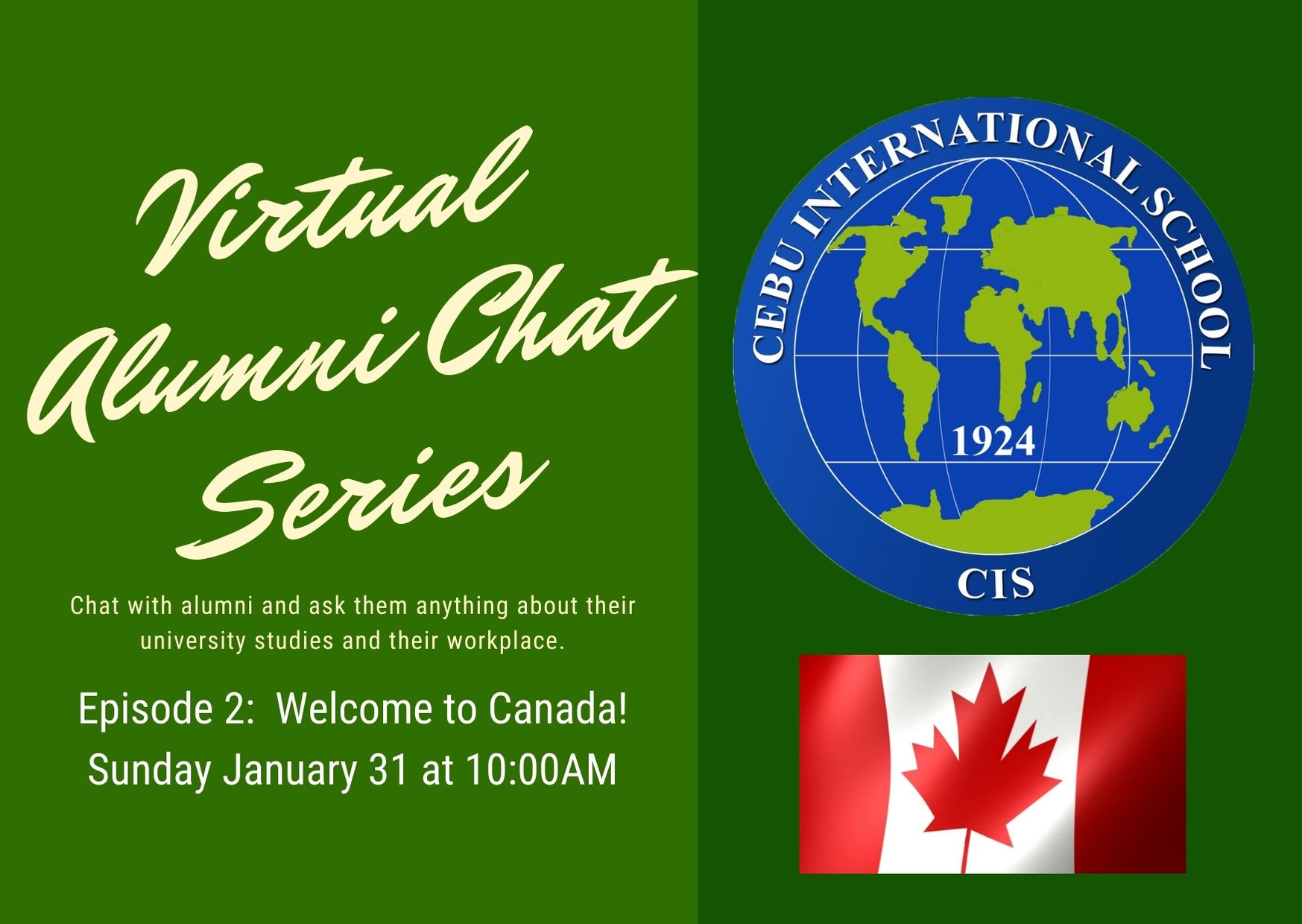
Virtual Chat with Alumni: Welcome to Canada!
Click this LINK to join.
Alumni Guests:
- Yearin Kim, Class of 2012 – McGill University
- Gabby Pochiet, Class of 2015 – McGill University
- Jonghwan Kim, Class of 2015 – McGill University
- Alyssa Sacal, Class of 2017 – University of British Columbia
- Sophia Barnard, Class of 2017 – McGill University
- Raf Peligro, Class of 2018 – Mount St. Vincent University
- Joaquin Suarez, Class of 2019 – Simon Fraser University
- Liam Sacal, Class of 2020 – Simon Fraser University
Join us and ask them anything about living and studying in Canada.
February 2 – Tuesday
and onwards
February 4
Thursday
8:00 AM
University of Southern California (USA)
LINK to register and choose a schedule of your choice.
February 4
Thursday
12:00 AM
Embry-Riddle Aeronautical University (USA)
LINK to register and choose a schedule for future sessions
If you are unable to join a session, links are provided to view pre-recorded sessions.
10 Minute Pre-Recorded Information Session
60 Minute Pre-Recorded Information Session
February 6
Saturday
6:00 PM
Breda University of Applied Sciences
(Netherlands)
Digital Discovery Day
LINK to register and view the programme.
You can register for as many sessions as you want, but please note that you have to register for each session separately.
If you’re not able to join “live”, you will be provided a recording if registered.
February 7
12:00 MN
Seton Hall University (USA)
Virtual Open House (Live event)
Click HERE to register
SAT UPDATE
The College Board announced this week that it plans to discontinue the optional essay component and SAT Subject tests. Please check this link for more details.
With the cancellation of the test dates in the first semester, it is highly likely that future test dates below may be cancelled too due to the pandemic. An update will be announced as soon as confirmation is received from the College Board. At the moment, these dates are open for registration.
Students are advised to check the university websites for Test-optional announcements.
| 2020-2021 Test Dates | Test | Registration Deadline |
| March 13, 2021 | SAT only (no Subject tests) | February 12, 2021 |
| May 8, 2021 | SAT & SAT Subject Tests | April 8, 2021 |
| June 5, 2021 | SAT & SAT Subject Tests | May 6, 2021 |
To register for the SAT, you may click on this link. If you need assistance or have any questions, please feel free to email Ms. Jenny Basa at jbasa@cis.edu.ph.



